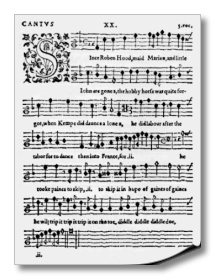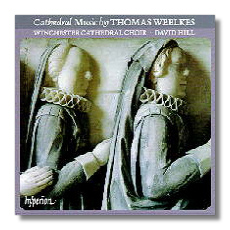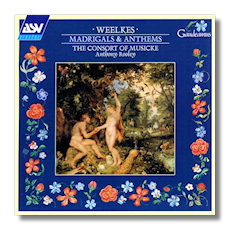
The Internet's Premier Classical Music Source
Related Links
-
Find CDs & Downloads
Amazon - UK - Germany - Canada - France - Japan
ArkivMusic - CD Universe
Find DVDs & Blu-ray
Amazon - UK - Germany - Canada - France - Japan
ArkivMusic-Video Universe
Find Scores & Sheet Music
Sheet Music Plus -
Recommended Links
Site News
Thomas Weelkes

(1576 - 1623)
Thomas Weelkes (baptised October 25, 1576 - buried December 1, 1623) was an English composer and organist primarily known for his vocal works that include madrigals, anthems, and services. Most writers consider him the finest Tudor composer after William Byrd.
We probably know less about Weelkes than we do about Shakespeare, so much of what has been written about him comes down to inference. He seems to have been a difficult man and was fired from at least one job for habitual drunkeness and absence from his duties. He moved from household to household, employment to employment. In his lifetime, his music was known and respected. Along with Morley and Wilbye, he contributed to the musicians' presentation to Queen Elizabeth, the madrigal collection The Triumphs of Oriana. He was organist at Chichester Cathedral. However, his wife's death in 1622 exacerbated his alcoholism and erratic behavior. He died at a friend's house in London.
Critics rate his church anthems and madrigals the highest part of his achievement. Most of his best music is grave in mood, usually in five or six parts. He lacked Morley's facility for dance-like fleet music, although he did create the masterful "Hark all ye lovely saints above," one of the lightest and finest madrigals of the era. His great strength is a modern, expressive use of dissonance, as in the anthem "When David Heard." The simultaneous soundings of major and minor thirds become stabs of pain and sobs, and furthermore they arise from a masterful contrapuntal technique. Every line on its own makes sense. Curiously, his simpler music isn't all that interesting, generally speaking. Counterpoint either breaks down or doesn't exist, and the lines are short-winded, relying on sequence and repetition to fill out time. He seems to have needed space and resources. When he used them, nobody bettered him. ~ Steve Schwartz
Recommended Recordings
Choral Music
- 13 Anthems and Motets for 5, 6 & 7 Voices/Hyperion CDA66477
-
David Hill/Choir Of Westminster Cathedral
Amazon - UK - Germany - Canada - France - Japan
Reissued as Helios CDH55259
Amazon - UK - Germany - Canada - France - Japan - ArkivMusic - CD Universe
- 17 Anthems w/ instrumental works by Morley/Naxos 8.553209
-
Jeremy Summerly/Oxford Camerata
- 19 Madrigals & Anthems/Academy Sound & Vision Gaudeamus CDGAU195
-
Anthony Rooley/Consort of Musicke















